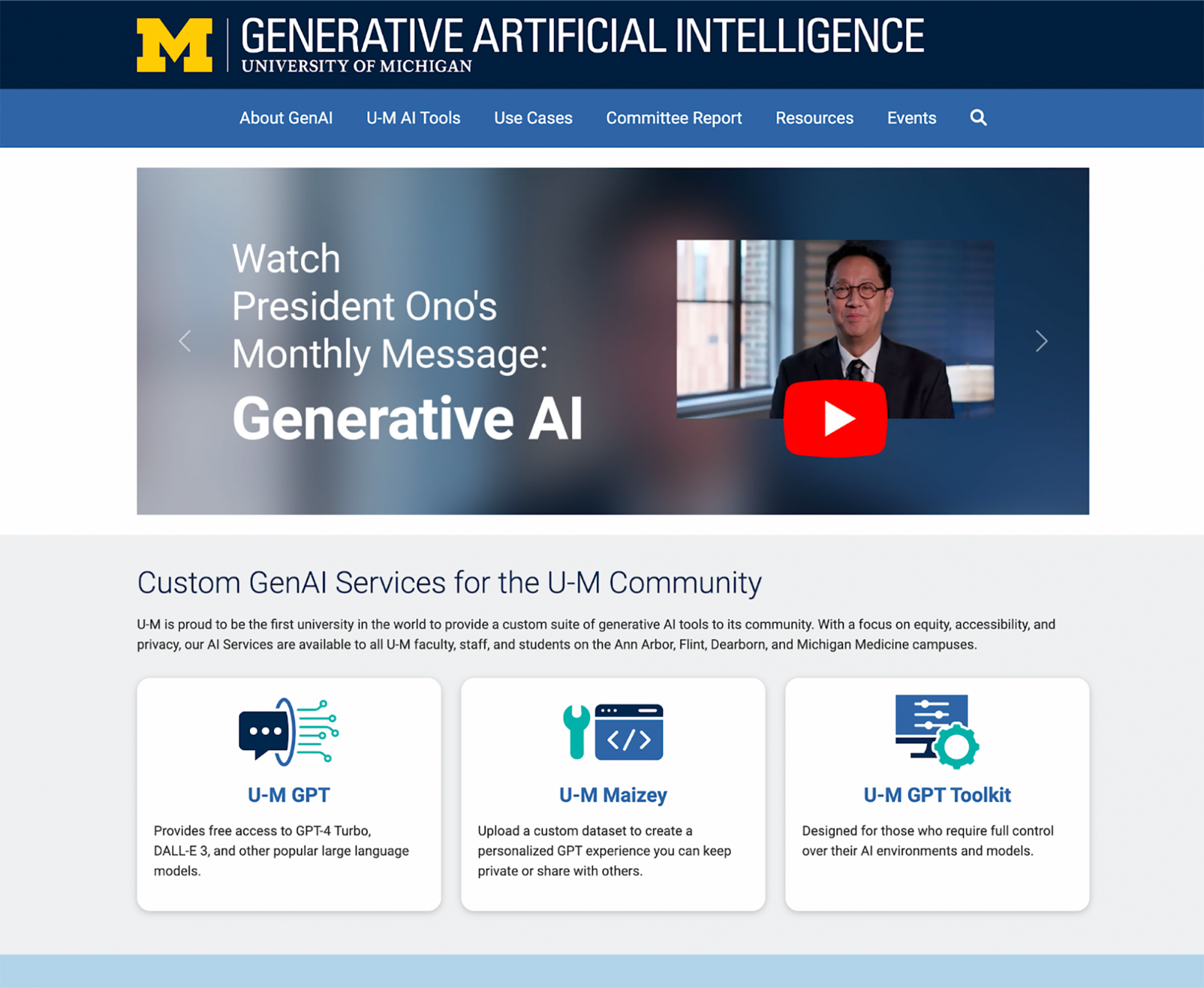FY2024 Accomplishments

Bringing Generative Artificial Intelligence to U-M
In August 2023, the University of Michigan marked a milestone as the first major university to launch generative artificial intelligence (GenAI) platform specifically designed for the campus community. This innovative suite of AI tools aims to enhance learning, streamline administrative tasks, and uphold stringent standards of security, privacy, accessibility, and equitable access.
This platform was conceived and built by ITS’ first-ever Emerging Technology team, a new group dedicated to exploring ways to integrate groundbreaking technology into higher education and the daily lives of our community.
Their innovative GenAI platform includes U-M GPT, U-M Maizey, and the U-M GPT Toolkit, three powerful AI tools tailored to meet the unique needs of the Michigan community. U-M GPT provides access to popular AI models such as GPT-4 Turbo, GPT-3.5 Turbo, Llama 2, and DALL-E 3, enabling users to leverage advanced language processing and image generation capabilities. U-M Maizey offers personalized AI assistance and tutoring by being trained on university and classroom-specific documents. The U-M GPT Toolkit is designed to support custom AI model development and deployment, allowing users to create tailored AI solutions for their specific needs.
What GenAI Brought to U-M in FY2024
The ITS Emerging Technology made a significant impact this past year through their establishment of the university’s first-of-its-kind GenAI platform. Built with the core values of inclusivity, equity, accessibility, and privacy in mind, ITS’ GenAI platform revolutionized the way that U-M students, faculty, and staff all engage with artificial intelligence technology.
Within one academic year, U-M GPT garnered over 34,000 users and inspired the creation of 1,692 unique Maizeys by our vibrant community of faculty, staff, and students. The platform's commitment to user education is evident, with over 1,200 individuals completing GenAI training shortly after the platform's launch. The Emerging Technology team’s dedication to continuous improvement has led to 20 feature enhancements and technical updates to the GenAI tools since their unveiling in fall 2023.
As pioneers in the field, ITS developed the world's first custom suite of GenAI tools tailored to the university environment, achieving this remarkable feat within just two months. Recognizing the cross-functional impact of these tools, the ITS Service Center harnessed the technology for improved ticket triaging and knowledge base article creation, resulting in more meaningful customer interactions and considerable time savings.
The platform is not just an operational asset but also a pivotal educational resource. It has improved student grades and allowed faculty to more effectively manage their time, particularly when responding to student inquiries. GenAI's footprint in advancing U-M's research and clinical missions also demonstrates its expansive versatility.
Bringing the Team Together and What Comes Next
The ITS Emerging Technology team, consisting of six full-time and six part-time members, continues to orchestrate the GenAI platform's evolution, reflecting ITS' commitment to embodying progress through technology. The team’s efforts have resulted in powerful endorsements from the U-M President, Provost, esteemed faculty, the State of Michigan, the City of Detroit, and even at the national level in Washington D.C. The team is on the cusp of launching an exciting addition to the platform with the upcoming GoToCollege AI-assisted scholarship search website and the development of an AI student assistant to enhance the Fall 2024-2024 semester experience. Complementing the platform’s suite of tools, the DALL-E 3 image generator was incorporated into U-M GPT and made available to the university community at no cost in February 2024.
The ITS Emerging Technology team remains dedicated to advancing the academic experience and operational success of U-M through strategic and impactful technology solutions. Examples of their work and use cases can be found on the official U-M Generative AI website.
Testimonial
“The U-M GenAI platform is a fantastic equalizer for helping all students learn how to use these tools and accelerate their learning.”
Select GenAI Use Cases in FY2024
-
U-M Ross School of Business faculty members used Maizey to build a 24/7 AI tutor for their courses, informed by past course data, which has served more than 1,000 students. By answering standard questions, the tool saved between 5 to 12 instructor hours every week. Surveyed students who used the Ross Maizey throughout their class noted as high as a 5% improvement in their grade performance.
-
The U-M College of Literature, Science, and the Arts (LSA) used U-M Maizey to create LSA Maizey AI Advising, a 24/7 AI chatbot they call a “smart sidekick for college life.” The tool tells students, “Need quick info about requirements, campus events, or study tips? It's got you covered anytime, day or night.”
-
Stephen A. Smith, a Professor of Biology at U-M's College of Literature, Science, and the Arts, led a research group, which used Maizey to build a tool that allows the U-M Herbarium to automate the transcription of museum specimen labels.
-
Dr. Andrew Tai (Associate Professor of Internal Medicine, Assistant Dean for Early Medical Education, Medical School) is using lecture PowerPoints and video transcripts exported from Mediasite (lecture capture) and imported into Maizey to better understand where and how his course learning objectives are addressed in lecture materials. The team is now evaluating if and when they might open up their Maizey to students for instructional support.
-
ITS Emerging Technology has partnered with U-M's Precision Health and Michigan Medicine on multiple AI use cases. The most impactful has been the use of Maizey in the automatic assignment of ICD-10 codes to patient records based on patient notes and other information. It is believed the current manual assignment process loses Michigan Medicine tens of millions per year.
More examples can be found on the U-M Generative AI website.
